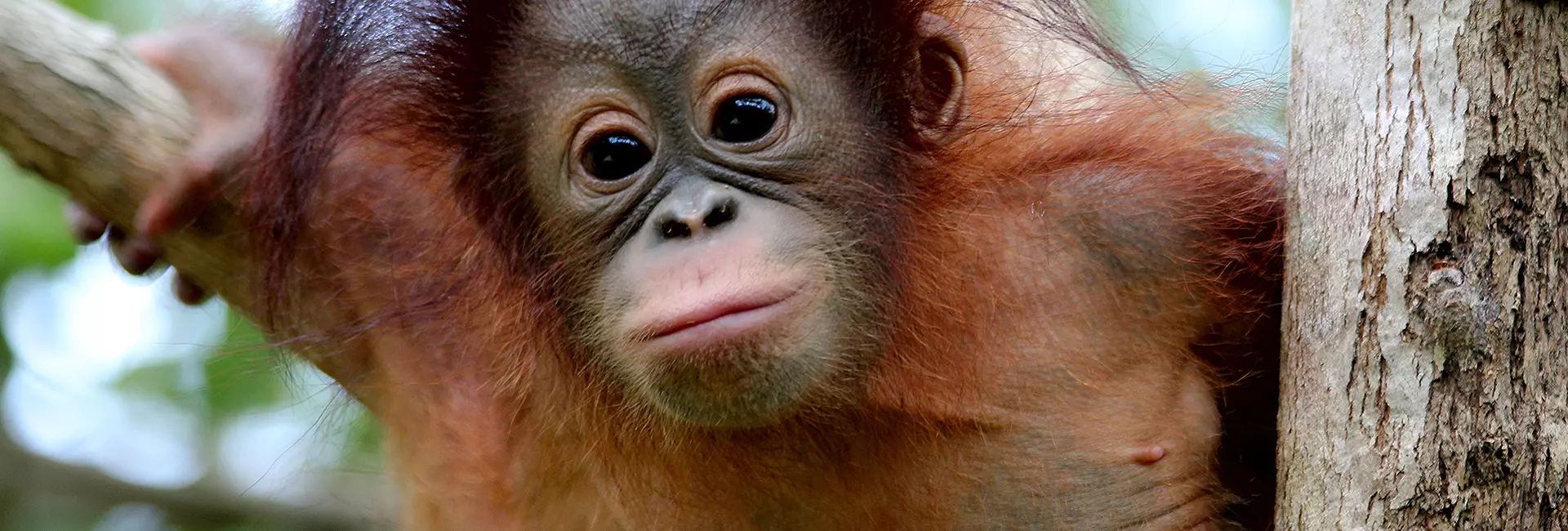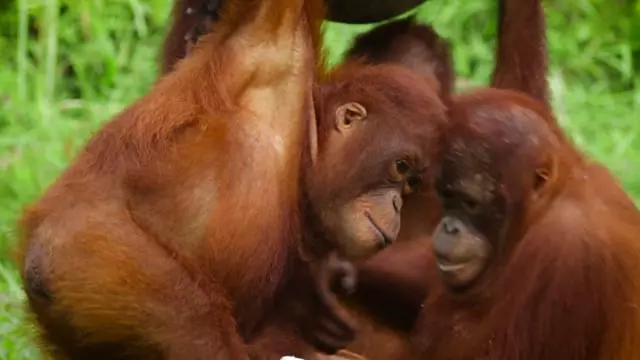
Orangutans
Volunteer With Orangutans
To play your part in helping to save this critically endangered great ape, volunteer with orangutans in Borneo for a chance to aid in the rehabilitation and release of our closest relative.
Native to just two islands, Borneo and Sumatra, orangutans are currently only found in the rainforests of these islands or at a number of orangutan sanctuaries throughout Borneo.
They remain critically endangered and much of the orangutan volunteer programmes we offer at The Great Projects strive to help counteract this issue and help to rescue and rehabilitate these magnificent apes. Here at The Great Projects, we offer a number of award-winning orangutan volunteer projects that work to improve the lives of those apes in captivity, as well as those that successfully release orangutans into protected areas of the wild.
Orangutans play the role of the ‘gardeners’ of the forest, helping to maintain their overall health through seed dispersal and making gaps in the trees to allow sunlight through so the forest can naturally regenerate. They face many threats from habitat loss, poachers and the illegal wildlife trade.
By becoming an orangutan volunteer, you can play a vital role in assisting to bring these incredible creatures back from the brink, so why not take a look at our orangutan volunteer projects and secure your place today! Choosing to volunteer with orangutans is a great opportunity to make a real difference in the life of the Bornean orangutan.

Projects Do More
7 - 28 Nights from $1,074.00 $913.00
Volunteer with orangutans on this award-winning orangutan project at Matang Wildlife Centre in beautiful Borneo!
View project12 - 26 Nights from $2,019.00
Work on enrichment for 112 orangutans and 72 sun bears at the world-renowned Samboja Lestari Rescue Centre
View project6 Nights from $1,249.00
Travel with your family to Borneo, and see how you can aid orangutan conservation whilst meeting indigenous tribes-people on this exciting wildlife safari!
View project11 Nights from $2,086.00
Help to restore Borneo’s rainforest and provide a safe home for wild orangutans and pygmy elephants.
View project12 - 26 Nights from $1,614.00
Help to rehabilitate the largest number of rescued orangutans in the world by volunteering at this orangutan sanctuary – made famous by the TV show Orangutan Jungle School!
View projectTours See More
On the Blog
Orangutan Information
orangutans at a glance
Endangered Status
Critically Endangered
Number remaining in the wild
Less than 120,000
Endemic Region
Borneo and Sumatra
Both the Bornean and Sumatran orangutan are considered critically endangered by the IUCN and this status looks unlikely to change anytime soon. 100 years ago, orangutan numbers were estimated to be around the 230,000 mark, but nowadays, that number has dropped dramatically.
There are thought to be fewer than 54,000 Bornean orangutans left, and a tiny 6,000 Sumatran orangutans remaining. Population numbers of their newly discovered cousin, the Tapanuli orangutan, sit around just 900 individuals. With the population suffering from a 75% drop in just 100 years, the rate of decline is unsustainable and the orangutans are in grave danger of ceasing to exist. Few other animal species have suffered a population drop as drastic as that of the orangutan, and that is why change needs to happen and it needs to happen soon.
You can visit orangutan rehabilitation centres and protected areas in Borneo and Sumatra, such as Samboja Lestari, Nyaru Menteng and Tanjung Puting National Park, to observe orangutans ethically. Choose eco-friendly tours or volunteer projects to learn about orangutan conservation while respecting their natural habitat, and always avoid direct contact to ensure their well-being and preservation.
Holding an orangutan or any other wild animal is not recommended or ethical. Orangutans are endangered species, and interacting with them in such a manner is harmful to their well-being and conservation efforts. It's essential to prioritize the welfare of these animals and respect their natural behaviours and habitats.
Orangutan Jungle School was filmed at the Nyaru Menteng Orangutan Sanctuary run by the Borneo Orangutan Survival Foundation, and you can join a volunteer project there for 2 or 4 weeks between April and September each year with The Great Projects.
Volunteers may assist in a variety of tasks including feeding the orangutans, cleaning enclosures, monitoring behaviour, providing enrichment, and participating in reforestation efforts.
Orangutans are facing numerous threats to their survival, including habitat loss due to deforestation from the palm oil industry, illegal logging, and agricultural expansion, as well as poaching, human-wildlife conflict, and the illegal pet trade.











